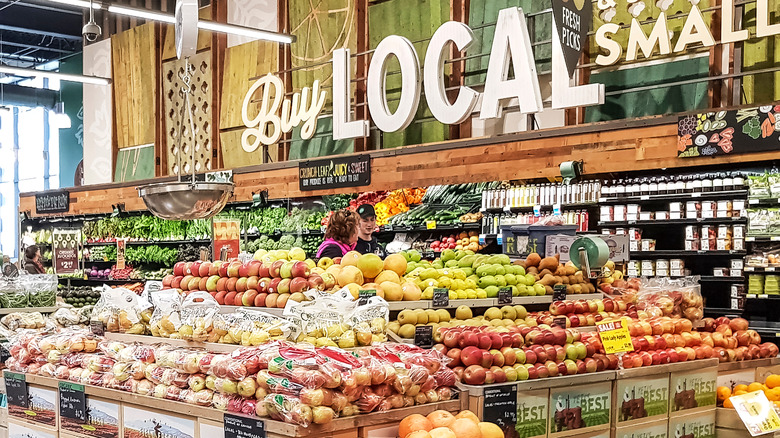How Whole Foods Makes You Think Its More Sustainable Than It Really Is
"Permacrisis" is a word that has surged to prominence, with BBC News noting that it means pretty much exactly what you'd expect it to: "an extended period of instability and insecurity, especially one resulting from a series of catastrophic events." The world in a nutshell, it seems.
There are certainly plenty of crises about. Harvard Business School lists matters including climate change, inequality, and racism as only some of the problems existing in modern life, but explains how crucial it is for businesses to recognize the importance of fighting them, arguing that companies should focus on people, planet, and profit.
This is otherwise known as sustainability, and the school believes that the more sustainable a business is the more successful it is as well. However, this may not be as straightforward as it seems. Even though a business might actually be relatively sustainable, this isn't always communicated well to customers. This is demonstrated by Whole Foods, which A&M explains is perceived to be more sustainable than it actually is. But how might Whole Foods pull this off?
Whole Foods is good at promoting its sustainability
According to Brightly (assessing factors such as plastic bag distribution, diversion of food waste, and energy usage), Aldi is the most sustainable popular grocery chain, with Whole Foods lagging in second place. So why does A&M report that Aldi receives less recognition for its efforts than Whole Foods?
It's all down to marketing — A&M confirms that if companies fail to adequately publicize their sustainability efforts through digital communication, product labels, and QR codes, the message simply won't get across. A comparison of the companies' Twitter accounts tells us a lot: Whereas Whole Foods showcases fresh and organic produce, Aldi focuses on humor and cheap products. It's a similar story with the brands' sustainability reports. Whole Foods advertises clearly-labeled organic goods, boasts vans redistributing unwanted food, and fills pages with greenery; Aldi chooses less eye-catching statistics and detail.
The information in the reports seems to show that Aldi is performing better than Whole Foods with some of its sustainability efforts. Aldi is doing more to reduce the carbon footprint of its locations and is also acting to reduce unnecessary packaging — something that Whole Foods doesn't mention. The two brands seem to be matched in their donations to good causes, but Whole Foods is seen to be making more progress with diverting food waste.

